Filter by
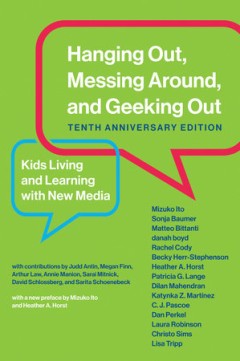
Hanging Out, Messing Around, and Geeking Out: Kids Living and Learning with N…
The tenth-anniversary edition of a foundational text in digital media and learning, examining new media practices that range from podcasting to online romantic breakups. Hanging Out, Messing Around, and Geeking Out, first published in 2009, has become a foundational text in the field of digital media and learning. Reporting on an ambitious three-year ethnographic investigation into how young…
- Edition
- -
- ISBN/ISSN
- 9780262354653
- Collation
- -
- Series Title
- -
- Call Number
- -

Teaching Computational Thinking: An Integrative Approach for Middle and High …
A guide for educators to incorporate computational thinking—a set of cognitive skills applied to problem solving—into a broad range of subjects. Computational thinking—a set of mental and cognitive tools applied to problem solving—is a fundamental skill that all of us (and not just computer scientists) draw on. Educators have found that computational thinking enhances learning across…
- Edition
- -
- ISBN/ISSN
- 9780262366144
- Collation
- -
- Series Title
- -
- Call Number
- -
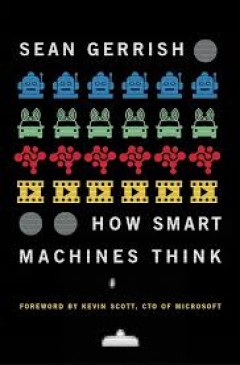
How Smart Machines Think
The future is here: Self-driving cars are on the streets, an algorithm gives you movie and TV recommendations, IBM's Watson triumphed on Jeopardy over puny human brains, computer programs can be trained to play Atari games. But how do all these thingswork? In this book, Sean Gerrish offers an engaging and accessible overview of the breakthroughs in artificial intelligence and machine learning t…
- Edition
- -
- ISBN/ISSN
- 9780262347938
- Collation
- 1 online resource (xiv, 298 pages)
- Series Title
- -
- Call Number
- -
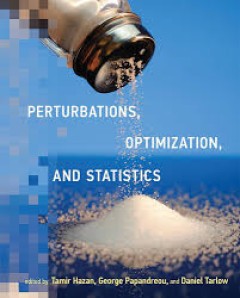
Perturbations optimization and statistics
A description of perturbation-based methods developed in machine learning to augment novel optimization methods with strong statistical guarantees.In nearly all machine learning, decisions must be made given current knowledge. Surprisingly, making what is believed to be the best decision is not always the best strategy, even when learning in a supervised learning setting. An emerging body of wo…
- Edition
- -
- ISBN/ISSN
- 9780262337939
- Collation
- 1 online resource (ix, 401 pages).
- Series Title
- -
- Call Number
- -
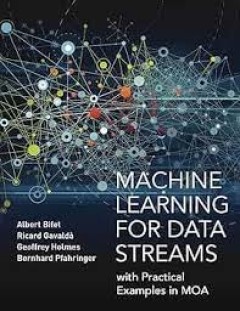
Machine learning for data streams with practical examples in MOA
A hands-on approach to tasks and techniques in data stream mining and real-time analytics, with examples in MOA, a popular freely available open-source software framework.OCLC-licensed vendor bibliographic record.
- Edition
- -
- ISBN/ISSN
- 9780262346047
- Collation
- 1 online resource (xxi, 262 pages) :illustrations.
- Series Title
- -
- Call Number
- -
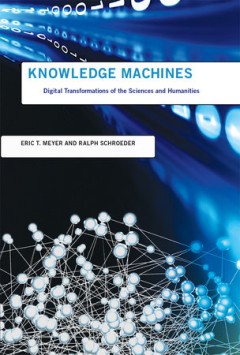
Knowledge Machines: Digital Transformations of the Sciences and Humanities
In Knowledge Machines, Eric Meyer and Ralph Schroeder argue that digital technologies have fundamentally changed research practices in the sciences, social sciences, and humanities. Meyer and Schroeder show that digital tools and data, used collectively and in distributed mode -- which they term e-research -- have transformed not just the consumption of knowledge but also the production of know…
- Edition
- -
- ISBN/ISSN
- 9780262328180
- Collation
- 1 online resource (x, 271 pages) :illustrations.
- Series Title
- -
- Call Number
- -
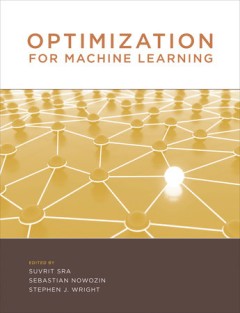
Optimization for machine learning
An up-to-date account of the interplay between optimization and machine learning, accessible to students and researchers in both communities.The interplay between optimization and machine learning is one of the most important developments in modern computational science. Optimization formulations and methods are proving to be vital in designing algorithms to extract essential knowledge from hug…
- Edition
- -
- ISBN/ISSN
- 9780262298773
- Collation
- 1 online resource (ix, 494 pages) :illustrations.
- Series Title
- -
- Call Number
- -

Blended learning in practice :a guide for practitioners and researchers
A guide to both theory and practice of blended learning offering rigorous research, case studies, and methods for the assessment of educational effectiveness. Blended learning combines traditional in-person learning with technology-enabled education. Its pedagogical aim is to merge the scale, asynchrony, and flexibility of online learning with the benefits of the traditional classroom--content-…
- Edition
- -
- ISBN/ISSN
- 9780262351546
- Collation
- 1 online resource (416 pages).
- Series Title
- -
- Call Number
- -

Production system models of learning and development.
Cognitive psychologists have found the production systems class of computer simulation models to be one of the most direct ways to cast complex theories of human intelligence. There have been many scattered studies on production systems since they were first proposed as computational models of human problem-solving behavior by Allen Newell some twenty years ago, but this is the first book to fo…
- Edition
- -
- ISBN/ISSN
- 0262111144
- Collation
- 1 online resource.
- Series Title
- -
- Call Number
- -

Scientific Inquiry in Mathematics - Theory and Practice
This valuable resource provides an overview of recent research and strategies in developing and applying modelling to promote practice-based research in STEM education. In doing so, it bridges barriers across academic disciplines by suggesting activities that promote integration of qualitative science concepts with the tools of mathematics and engineering. The volume’s three parts offer a com…
- Edition
- 1
- ISBN/ISSN
- 978-3-319-89524-6
- Collation
- Mathematics
- Series Title
- -
- Call Number
- 510
 Computer Science, Information & General Works
Computer Science, Information & General Works  Philosophy & Psychology
Philosophy & Psychology  Religion
Religion  Social Sciences
Social Sciences  Language
Language  Pure Science
Pure Science  Applied Sciences
Applied Sciences  Art & Recreation
Art & Recreation  Literature
Literature  History & Geography
History & Geography